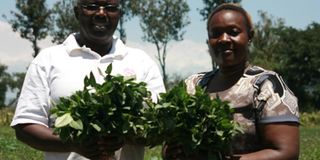Premium
I pick my pension from traditional vegetables

John Rioba with his wife Lilian Kwamboka at their vegetable farm in Lanet, Nakuru. PHOTO | CAROLINE CHEBET |
What you need to know:
- Rioba retired about 10 years ago and soon embraced traditional vegetables.
- With his wife Lilian Kwamboka, the Riobas have been growing the vegetables on two acres for the past two years.
Along the Nakuru-Nairobi highway, various traders have erected stalls selling different horticultural produce that include vegetables and fruits.
There is big business along the road as travellers normally stop and buy the produce.
Standing out among traders with stalls at a spot on the highway is Rtd Colonel John Rioba, 58.
Rioba sells mainly traditional vegetables that include sagaa or saget (spider plant), managu (night shade), kunde (cow peas) and terere (amaranth), which he harvests from his farm.
“Afande nipe kunde mbili (Officer, sell me two bunches of kunde),” a man says as he hands him Sh100. Each bunch goes for Sh50.
Rioba retired about 10 years ago and soon embraced traditional vegetables, which he grows on his home in Lanet, Nakuru.
With his wife Lilian Kwamboka, the Riobas have been growing the vegetables on two acres for the past two years. They own an acre while they have leased the rest from a neighbour at Sh6,000 a year.
To plant cow peas and saget, the farmer digs shallow trenches at a space of 12 inches.
“I then spread manure in the trenches and put in the seeds and cover the holes,” says the farmer who invested Sh4,000 when starting the business.
However, night shade is harder to produce as he has to plant the seeds first in seedbed for three weeks before transplanting.
LOOKING FOR VEGETABLES
But what made them start selling their produce themselves?
“There is a day last year we went to a supermarket in Nakuru and realised that people were looking for traditional vegetables but could not find them,” recounts Kwamboka.
The couple were then selling their produce to traders at wholesale price. They decided to start selling the vegetables from the boot of their car.
“We took our produce at a spot near the supermarket, which is along the highway, and on the first day sold vegetables worth Sh1,000,” says Rioba, who was making Sh400 a day by selling to brokers.
Since then, they sell the vegetables themselves from the boot of their car at the spot along the Nakuru-Nairobi highway.
Sundays are usually their peak days as they sell vegetables worth Sh10,000.
On average, Kwamboka says they make up to Sh80,000 per acre every month.
The earnings are better than what they used to get from maize, which they were initially growing.
“Maize takes eight months to mature, but the vegetables only six weeks, and there is ready market.”
The couple use organic manure from their 13 cows to grow the vegetables.
“People travelling to Nairobi along the highway are our biggest customers. They normally buy in bulk.”
They produce their own seeds by leaving some of the vegetables to overgrow. Then they harvest seeds, dry and plant to save costs.”
Rioba’s experience as a farmer has made him stand tall among former military men. He is often called to speak to his colleagues in barracks in Nakuru on how to live sustainably after retirement.
Geoffrey Kahuho, a trainer at Participatory Ecological Land Use Management, says farmers need to plough twice to ensure they plant the seeds on fine soil.
“Compost manure is the best as it ensures no chemicals are used yet the crops remain healthy. Traditional vegetables are profitable for small-scale farmers, especially if they sell directly to consumers.”
Getting into direct contact with consumers, according to Kahuho, also gives a farmer chance to explain his means of production.





